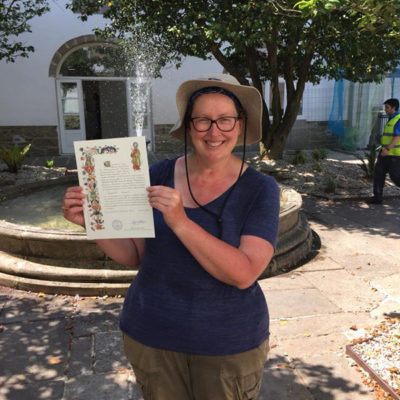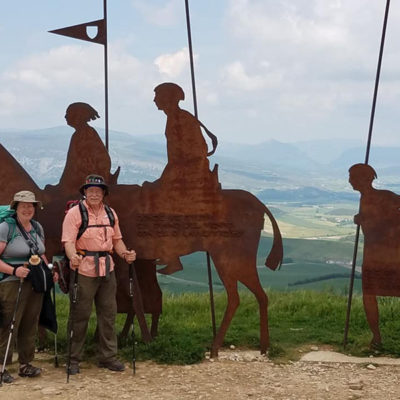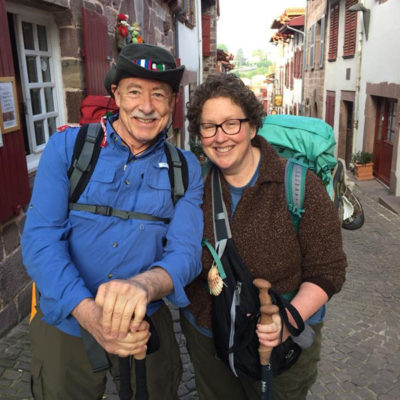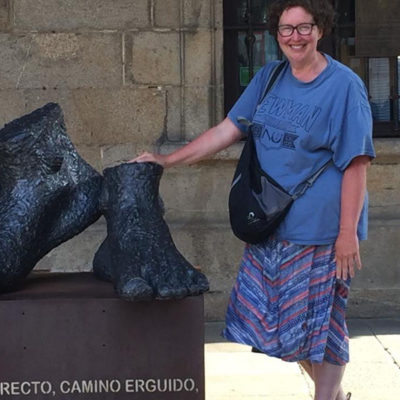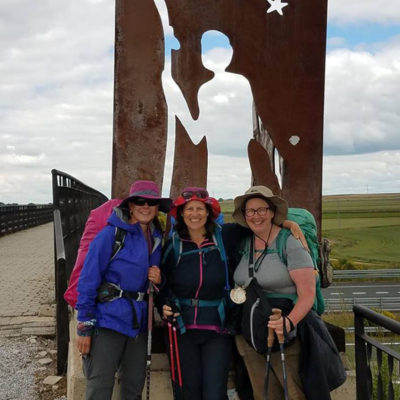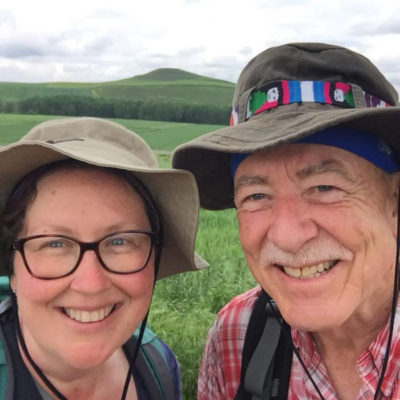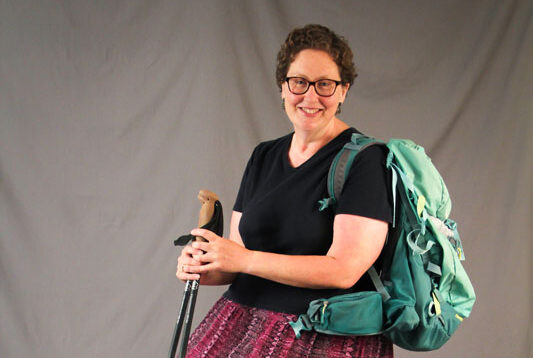
A spiritual journey in 500 miles
Chinese philosopher Lao Tzu once said, “The journey of a thousand miles begins with one step.”
By the end of her summer spiritual journey, Professor of Biology Sarah Evans, Ph.D., walked a total of 545 miles.
Evans spent 39 consecutive days walking the Camino de Santiago — a pilgrimage that starts in St. Jean Pied de Port, France, and ends in Finisterre, Spain, in honor of St. James the Great. She first heard about the walk 15 years ago, and after having a conversation with her cousin, Evans set a goal to one day embark on her own pilgrimage.
She had been walking every weekend over an 18-month span with Steve Dunn, a colleague who recently retired from Newman after 16 years as associate professor of education. Evans said she originally planned to walk the Camino de Santiago on her own, but the two decided to go together.
The duo prepared for the hike by increasing their mileage walked each week, breaking in their boots and wearing their packs while walking.
“We thought we were well prepared, but on that first day of hiking in the Pyrenees, it seemed like the path went straight up,” Evans said. “We realized how flat the terrain in Wichita really is.”
The two hiked through mountains, agricultural regions with vineyards, olive groves, wheat fields and even along the coast. At times they traveled through gravel and dirt, along an old river or streambed; other times they walked on cobblestone and paved roads.
Individuals from all walks of life participate in the Camino de Santiago, and Evans met people from the U.S., Canada, Europe, Central and South America, Asia, Australia and different African countries.
“People start at different points, so not all of them walked the same distance that we did,” Evans explained. “Some days I saw lots of people on the trail, some days it felt like I was the only one there.
“We all walked at different paces, so while we would start out together and usually eat meals together, we would always arrive at our daily destination at different times,” Evans said. “This gave us each a nice balance of solitude for reflection and meditation while we were walking as well as great company when we wanted it.”
Each day, Evans woke at 6 a.m. and left the hostel by 6:30 to start walking. She would walk to a village, stop for breakfast and continue walking until around 3 p.m. — stopping at another hostel for the night. She would be in bed by 10 p.m., ready to start up again the next day.
In many ways, Evans felt called to walk the Camino, she said.
“I knew that I wanted time to reflect on my life and think about direction, to ponder and meditate on some of the big questions. Certainly I could have done these things at home, but it seems like my schedule is just so busy and there are so many distractions that it’s hard to do this for an extended period of time in my regular life.
“There is something very comforting about walking the Camino,” she continued. “You can leave the busyness of life behind. The only thing that you need to focus on is walking, eating, sleeping, then doing the same the next day. That leaves a lot of room for reflection, meditation and prayer.”
Dunn described his experience walking the Camino as “remarkable.”
“The days were similar in design but each brought new beautiful vistas, new physical challenges, new people and new thoughts,” Dunn said. “As our journey continued, I became more grateful for the Camino and for the good things in my life: family, friends, health, opportunities, challenges, pain, serendipity and perspective.”
He added, “My hope is that everyone in the world would wish each other a ‘Buen Camino’ as we find our way in this life. It’s such a simple, elegant and positive phrase of support that wishes us well as we do our best to travel our personal Camino.”
The Camino not only provided time for personal insight, but also for reflection on valuable life lessons, Evans said.
“I learned that I am stronger than I thought I was,” she said. “I learned that everyone has a story to tell, and when you really listen, you realize that we are much more similar than we are different. I was reminded that we live in a beautiful world and that people are genuinely kind.”
Evans said that, in many ways, the Camino de Santiago is a metaphor for life.
“Some days you have a lot of energy and feel like you can go forever, and other days you feel like you don’t want to get out of bed. Some days are rainy and cold and just hard, while other days are sunny and it feels like nothing can go wrong. But when you finally fight your way to the top, you have an incredible view that completely changes your perspective.”
She learned that it is all right to ask for help, direction and encouragement.
“(I learned) that every now and then it’s okay to set your burdens down and rest for a little bit,” Evans said. “I think that all of these things are lessons that apply to our everyday lives.”


